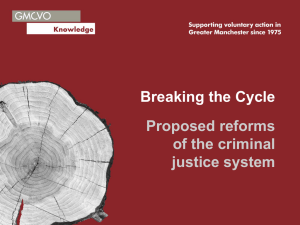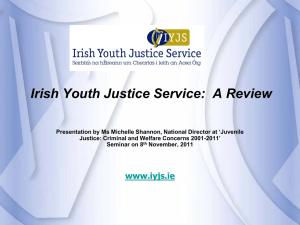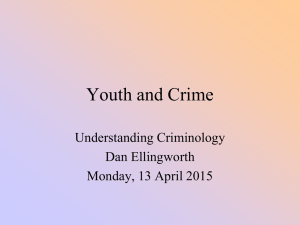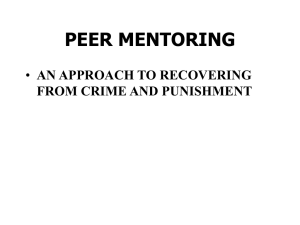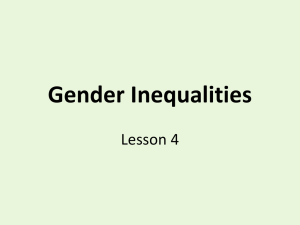The Church of England
advertisement
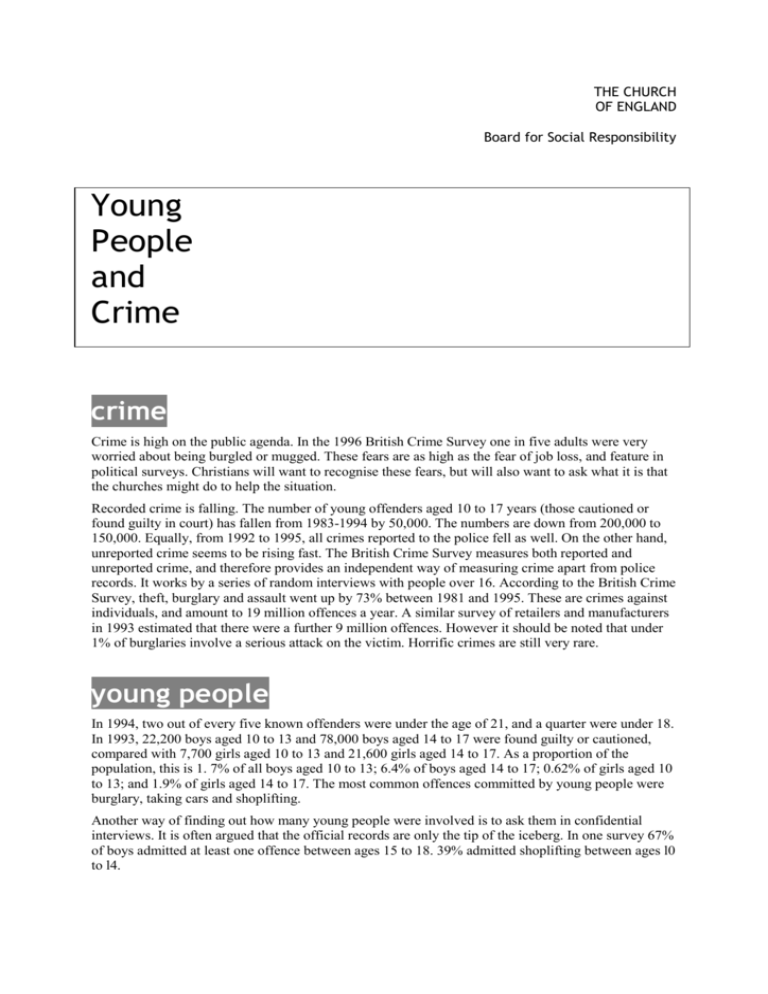
THE CHURCH OF ENGLAND Board for Social Responsibility Young People and Crime crime Crime is high on the public agenda. In the 1996 British Crime Survey one in five adults were very worried about being burgled or mugged. These fears are as high as the fear of job loss, and feature in political surveys. Christians will want to recognise these fears, but will also want to ask what it is that the churches might do to help the situation. Recorded crime is falling. The number of young offenders aged 10 to 17 years (those cautioned or found guilty in court) has fallen from 1983-1994 by 50,000. The numbers are down from 200,000 to 150,000. Equally, from 1992 to 1995, all crimes reported to the police fell as well. On the other hand, unreported crime seems to be rising fast. The British Crime Survey measures both reported and unreported crime, and therefore provides an independent way of measuring crime apart from police records. It works by a series of random interviews with people over 16. According to the British Crime Survey, theft, burglary and assault went up by 73% between 1981 and 1995. These are crimes against individuals, and amount to 19 million offences a year. A similar survey of retailers and manufacturers in 1993 estimated that there were a further 9 million offences. However it should be noted that under 1% of burglaries involve a serious attack on the victim. Horrific crimes are still very rare. young people In 1994, two out of every five known offenders were under the age of 21, and a quarter were under 18. In 1993, 22,200 boys aged 10 to 13 and 78,000 boys aged 14 to 17 were found guilty or cautioned, compared with 7,700 girls aged 10 to 13 and 21,600 girls aged 14 to 17. As a proportion of the population, this is 1. 7% of all boys aged 10 to 13; 6.4% of boys aged 14 to 17; 0.62% of girls aged 10 to 13; and 1.9% of girls aged 14 to 17. The most common offences committed by young people were burglary, taking cars and shoplifting. Another way of finding out how many young people were involved is to ask them in confidential interviews. It is often argued that the official records are only the tip of the iceberg. In one survey 67% of boys admitted at least one offence between ages 15 to 18. 39% admitted shoplifting between ages l0 to l4. Minor criminal behaviour is very much a feature of adolescence, as is casual use of soft drugs for some young people. The great majority of adolescents grow out of criminal behaviour fairly quickly. offenders Most young people grow out of crime. The majority of offenders are cautioned, which is a lecture from a police officer in the presence of a parent or other appropriate adult. 80% of those who are cautioned do not come to police attention again. But it becomes less effective once a pattern of offending sets in. What factors which might lead a young person to offend? All the research which has been done on why young people might offend points in the same direction. It involves dysfunctional families, poor educational achievement at school, truanting, the negative influence of peer groups, drug misuse, and a low chance of getting a job. We know both from experience and research what are the factors which make it likely that young people will become involved in crime. This is where church people can help, for the reasons why offences happen are not inevitable. For the Christian, there is no option of ignoring anyone’s capacity to give and receive as a member of a community, to be part of a social enterprise, a shared work. Bishop Rowan Williams family factors Children brought up in families with lax parental supervision and in poor neighbourhoods are at much higher risk of offending. It is inconsistent parental discipline (where, for instance, one parent says one thing and one another) which also creates problems. There is a lack of clear boundaries. These stresses are made far worse by hardship, and the insecurity of unemployment, poor health and low income. Yet children increasingly are facing poverty. The number of children living in homes with half the average national income has gone up from 16% to 33% between 1981 and 1992. Families who are poor, where neither parent has a job, are especially under stress. Where parenting breaks down, and there is cruelty, abuse, harsh or erratic discipline, children will be far more likely to offend. As young people weaken their ties with their families, they are again more likely to offend. Research has shown that children who live in a single parent or stepparent family are more at risk of offending than those who live with both natural parents. This is not a direct result of the family structure itself: there are a whole number of reasons why the supervision of children is more difficult in these circumstances. The absence of one parent may make family relations more difficult. schools Where parents fail to socialize their children adequately, schools have to cope with bad behaviour among pupils. When this occurs at an early age, offending is more likely to develop later on. The first sign of trouble is poor attainment at school, followed by bad behaviour. Bullying is increasingly seen to be a major problem in schools. Truancy is followed by temporary, and then permanent, exclusions. It is very worrying that the number of permanent school expulsions is rocketing. In 1990 the figures were under 3,000 a year. In 1996 they were over 12,000: an increase of four times. 42% of young offenders of school age sentenced in court had been excluded from school, and 23% more had truanted significantly. who are young offenders? Young offenders are those sentenced in court to custody or a community order. 2/3 are unemployed, and 9/10 have no qualifications. 1/3 are involved with drugs. 1/3 have financial problems. 1/4 are drinking heavily. 1/4 have no fixed accommodation. 1/7 have mental health problems. 4/10 of those in young offender institutions (aged 15 to 20) have been in care. Young people released from custody may be difficult, damaged by their experience and appear resentful or distrustful of help. But they are all human beings, our brothers and sisters. Cardinal Basil Hume The peak age for offending is 15 to 18 years. While only 7% of the population is aged 18 to 20, almost 18% of the prison population falls into this age group. Unemployment among young people is at record levels. While not all young people who are unemployed are offenders, the link between unemployment and crime (while not causal) is certainly related. In a 1992 National Prison Survey, 46% of prisoners aged 21 to 24 had no qualifications. The figure is 16% for the general population. It is very hard to find a job without qualifications. Discrimination against young black people can reinforce the drift towards delinquency and crime. what can the churches do? The message is very clear. Those who are bringing up young people need understanding and support. Instead parents and young people in trouble often receive condemnation and scapegoating, both in the media and in society. There are different forms of support for those under 5, those under 12, and those who are adolescent. God’s justice is never simply limited to punishment, retribution and vengeance – it’s related also to his righteousness and holiness, to promoting love and peace, that shalom which is the spaciousness within which worthwhile life is exercised and enjoyed. Bishop Bob Hardy For under fives, there are family centres working with under supported parents. There can be help given there. However such support is not widely available. Voluntary organizations are underresourced. Where there are resources it needs to be specially targeted on the most vulnerable. Nursery provision is also important. For under twelves, there is help with children who find school difficult. For adolescents, there are many ways in which their lives touch those of church members. Parent governors at locally managed schools can raise questions about school exclusions. What is the policy on exclusions? What services are there for excluded young people? Young people need help with employment and housing. Some churches now provide support in this area. Others can support those who are helping in social services or the youth service. There is an urgent need for better youth services in England. The youth service has been decimated in recent years. Over 5,000 youth workers have gone in the last decade. Yet detached youth workers, and youth clubs, can make an enormous difference to young people’s lives. In particular, church members can 1. Write a letter to the local press. 2. Campaign for better safety in the community. 3. Offer support to social services in working with families who need help. 4. Offer support to local schools in helping with reading and numeracy. 5. Become involved in mentoring those coming out of care by young adults from churches and voluntary groups. 6. Insist on the need for much greater youth services in the community. 7. Help with the provision of accommodation or employment for young people in trouble. There are schemes involving some, or all, of these initiatives across the churches in England. in conclusion Locking up young people is an instrument of resort. There are times when, for the sake of society and for themselves, it is the only answer. Yet the cost is high. It brands them as criminals for the rest of their lives - and reduces even further their prospects of doing something useful with their lives. When in custody, there is no prospect of making an apology to the victim, or of reparation. What is needed is a way of making amends within the community. It is a matter of restoring relationships, and accepting the harm which the offence has caused. In the community, young people under supervision can work with others (such as the elderly) at useful and creative tasks. Both parties benefit from the encounter. At the moment there is too heavy an emphasis on custody and punishment. What is needed is the will to change the situation, and much greater resources to prevent youth offending. The churches can help in many small ways, by getting involved with supporting those who are already helping. Above all, young offenders must not be stigmatised or seen as less than human. They are young people in trouble, who need to find ways of contributing to society and belonging to it. The climate should be one where we rise above the attitudes and vocabulary of revenge, war and punishment for its own sake, and speak instead the language of justice, dominated by the aim of restoring broken relationships. Archbishop George Carey
